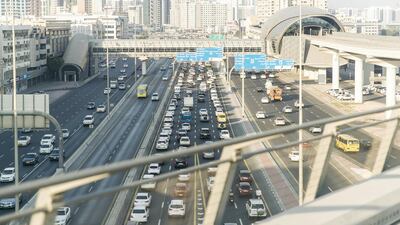Off-roading, waking up hours earlier than necessary and using two cars are some measures commuters between Sharjah and Dubai take in the hope of avoiding hours of traffic.
Leaving 10 minutes later than planned can mean that motorists are caught on the roads for more than double the time typically needed to reach their destinations.
Stalled cars, road repairs, car accidents, even bad weather as well as an aggressive traffic culture exacerbate congestion between the two emirates that some say has been a problem for nearly a decade.
Said Mahmoud, 38, has been driving between his home in Ajman and Dubai, where he works, for 10 years.
He said motorists drive "as though they own the road" and that attitude adds to a problem.
“Drivers want to overtake your car just to be ahead of you. Some drive on the hard shoulder to escape a few metres of congestion that stretches for several kilometres,” said Mr Mahmoud, who works as a communications consultant for a law firm at Dubai International Financial Centre.
Over the years, he has had to resort to several tricks in an effort to reduce time on the road and spend more time with his family after work.
_______________
Read more:
Salik, road tolls and how UAE motorists fare in global traffic jam rankings
Traffic congestion between Sharjah and Dubai 'to end in 2018'
Dubai commuters spent three working days stuck in heavy traffic last year, study finds
Special report: Life in the fast lane - the future of transport in the UAE
_______________
"I used to go off-road from Maliha to Al Khawaneej area," he said.
"Driving off-road requires an SUV and good sand-driving skills. I have seen many who lack these skills getting stuck in sand and - whenever I had spare time - I would stop and help get them out, but then authorities in Dubai blocked it off and it's no longer an option," he said.
On Monday, Dr Abdullah Al Nuaimi, Minister of Infrastructure Development, said a new bridge and motorway as well as a dedicated lane for lorries on Emirates Road would help drastically reduce congestion between Sharjah and Dubai this year.
“Al Budaiya Bridge, which stretches over the 4km that is considered the bottleneck, is expected to open for motorists in August this year,” Dr Al Nuaimi said.
Now 75 per cent complete, the bridge will handle an estimated 17,700 cars per hour, he said.
The bridge between Dubai’s Emirates Road and Sharjah’s Maliha motorway will help commuters regain their work-life balance and allow them to arrive at work or home stress-free instead of starting and ending their day worn out, said Mr Mahmoud.
Many residents who work in Dubai choose to live in Sharjah because rent is lower.
Aydah Kamal, a 55-year-old teacher, spends nearly four hours a day driving between Sharjah's King Faisal Street to her school in Jumeirah via AlIttihad Road.
“I took the job because it pays more. Then I discovered I was paying the price from my health,” said Ms Kamal, who is Sudanese.
“I'm diabetic and often fall ill on the road. I also pay the price of time spent with my five children, one of whom is autistic.”
Living in Dubai would mean she could avoid her daily 5am starts but she cannot move due to her and her husband's low salaries.
"I take any bridge or route that could save some of my time but the traffic has been like this for so long that I have lost hope that a change would come,' she said.
Yara Al Banna, 39, welcomed the announcement of the seven-lane bridge to ease traffic she has been suffering for nearly five years.
"I would carpool until I got my license and bought a car. It would take an average of six hours daily but getting a car reduced that to nearly four hours on most days," she said.
She said that the long hours on the road resulted in her gaining weight because she was eating her main meal between 8pm and 9pm after getting home from work.
After becoming pregnant Ms Al Banna, who said she has no option but to use Sheikh Mohammed Bin Zayed Road, said the long hours in the car would give her extreme back pain.
The dangerous driving on the motorway also led to a few occasions where she almost became involved in car accidents.
“Drivers brake suddenly sometimes and it is dangerous. I was three-months pregnant when, in a traffic jam, a car hit mine from behind and I spent the next three days suffering from terrible back pain. I was afraid I would lose my baby,” she said.
Some motorists have taken to beating the traffic using a two-car trick on the border between the two emirates.
An Emirati man who works for a public institution in Deira, but lives in Sharjah, said he takes advantage of owning two cars by parking one in a sandy area in the Sharjah side of Al Mamzar, crossing the border on foot, and driving his second car into Dubai.
The sand lot is partially blocked off by steel poles and stacked rocks by authorities but is quietly used by a few motorists who discovered the unique route.
"During morning peak hours, I drive my car from my Sharjah home towards this meeting point. I park and walk across through the steel poles and rocks to my other car which I parked on the Dubai side then drive away to my work," said the 40-year-old man.
He said his trick saves him a minimum of 30 minutes in Al Ittihad road’s morning traffic.


